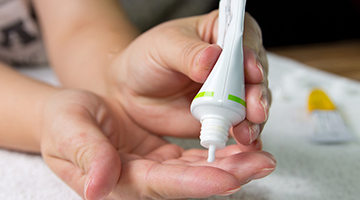Having psoriasis is one of the most significant hardships one can endure. If you have psoriasis, you know how the disease indulges you in a never-ending loop of trying endless medications. But let’s be honest here – there is no cure for psoriasis as the condition is primarily genetic or autoimmune. However, self-control, grit, determination, and perseverance can help you ease the discomfort caused by the disease. You can also rely on some home remedies to help you stay distant from all those hardships involved in the worst phase of psoriasis.
Here’s a list of self-care tips for those struggling with psoriasis.
Lifestyle and Home Remedies

- Take Daily Baths
Bathing helps to calm inflamed skin and remove scales. Opt for a soothing lukewarm bath to soothe inflammation. Just make sure not to keep it hot as it can aggravate those flare-ups. You can also rely on Epsom salts and soothing essential oils for extra comfort. - Moisturize and Soothe Skin
Use a moisturizer, especially after every shower, to combat dryness caused by psoriasis. Also, calm your flare-ups with the use of salicylic acid-based lotion. As a gentle exfoliant, salicylic acid helps remove scales and relieve itching and redness. It even restores moisture and keeps skin hydrated. - Expose Skin to Small Amounts of Sunlight
Scientific studies conclude that sun exposure can slow down the growth of skin cells associated with psoriasis. This can eventually lessen scaling and inflammation in those suffering from mild to moderate psoriasis. Just make sure to limit sun exposure, as prolonged exposure to UV rays can adversely affect your skin. - Try OTC Treatments
Seek medicated creams or ointments available at your local drugstore to reduce inflammation caused by psoriasis. Depending on the severity of your condition, OTC treatments, including corticosteroid creams, can help reduce itching and inflammation. - Avoid Psoriasis Triggers
Although the root cause of psoriasis is either genetics or autoimmunity, certain things can trigger the condition.Common psoriasis triggers include:- Dry and cold weather
- Infections, especially skin infections
- Stress
- Cuts, scrape, insect bites or sunburn
- Exposure to smoke
- Heavy alcohol consumption
Avoid these triggers to prevent or reduce most of the outbreaks.
- Skip Alcohol and Smoking
It’s a well-known fact that smoking and consuming alcohol can weaken your immune system and eventually increase the risk for psoriasis. Many researchers and medical practitioners also believe that alcohol increases the production of cell cycle activators and reduces the efficacy of psoriasis treatment. - Stress Less
Stress can trigger inflammatory conditions, and psoriasis is no exception. Studies show that stress triggered the disease in 31-88% of psoriasis cases. So, if you are coping with the condition, make sure to combat stress. Try de-stressing activities like yoga, spending time in the lap of nature, a warm bath, or simply listening to soothing music.
Coping and Support

At the end of the day, you aren’t alone. Understanding your condition through medical help and learning about treatment options can offer you long-term relief if you have psoriasis.
- Get Educated
Find out as much as you can about psoriasis and the relevant treatment options. Talk to your doctor or count on support groups who can help you in this regard. - Find a Support Group
Many support groups help those battling psoriasis. Such groups provide information about the disease and offer an opportunity to learn coping skills. Support groups for psoriasis offer services both online and in person. You can find the right one and get lifelong support. - Learn About Therapies and Treatments
Psoriasis treatments help to remove scales and stop skin cells from growing fast. Some potential treatments for the disease include:- Topical therapy for psoriasis that includes ointments and creams
- Light therapy for psoriasis, also known as phototherapy
- Oral or injected medications
Depending on the severity of psoriasis, your doctor will suggest a combination of treatments or different drugs. Follow your doctor’s recommendations to fight the disease like a pro!
Conclusion
There is no exact treatment for psoriasis. Your doctor will examine how severe your condition is and then prescribe different drugs or a combination of treatments. However, the disease can return at any point. It is advisable not to lose heart and keep your head high as you fight this notorious disease.
All you can do to get rid of psoriasis is keep fighting like a warrior. Another most important thing is to stay in touch with your doctor. Visit to find a skin specialist near you.














